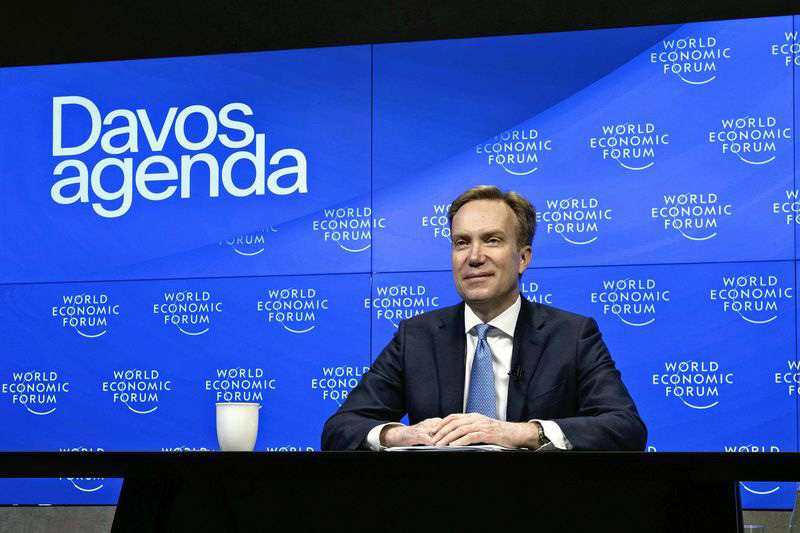
Borge Brende, president of the World Economic Forum
14:07 JST, February 14, 2022
As the COVID-19 pandemic enters its third year, there continue to be concerning issues on a global level, such as the spread of the omicron variant of the novel coronavirus, crises related to energy and climate, and tensions between nations. Can the world solve these issues through diplomatic efforts and international cooperation?
The Yomiuri Shimbun conducted an online interview with the World Economic Forum’s president, Borge Brende, a former foreign minister of Norway, to find out what he has to say about these issues.
For the first time in two years, the WEF plans to organize an in-person version of its annual meeting in Davos, Switzerland. Usually held in January, the 2022 Davos annual meeting is scheduled for May. In January, a virtual event called Davos Agenda was held, after which this interview was conducted.
The following is excerpted from the interview with Brende, who emphasized that “global challenges need global solutions.”
Social market economy
[Postponing the annual meeting] was not an easy decision for us. But I believe Davos Agenda was like a curtain-raiser to the important topics at the meeting in May.
For instance, in Davos Agenda Prime Minister Fumio Kishida introduced his “new form of capitalism” notion, and Japan can become a role model. I think what Prime Minister Kishida alluded to is a more inclusive market economy, like a social market economy that creates decent jobs and secures wealth that trickles down in accordance with what the planet can take. My view is that this still can lead to substantial economic growth over time, leading to a more sustained economic growth.
We will have to come back to Davos in May and focus on economy because we are now seeing a slowing global growth that has impact on the stock markets. We are not out of the woods. We need to know how to balance this continuing need to stimulate the economy while also controlling growing inflation. Even the inflation in Japan is increasing. That hasn’t happened for decades, right? So we are moving into new territory.
Common interest
For the annual meeting in May, not only economic revival, but also climate, biodiversity, and inclusion will be crucial topics. I think there is that extra responsibility on our shoulders to see a real outcome. Even if we’re living in a polarized world where the big nations don’t see eye to eye on many issues, we still know that global challenges need global solutions.
I’m optimistic that there are areas where we can find agreement because there is so much common interest in finding solutions. In the last minutes [of the U.N. climate change conference COP26] in Glasgow, U.S. climate envoy John Kerry came together with Chinese climate envoy [Xie Zhenhua], and they agreed on a text that kept [the target to limit global warming to] 1.5 C alive.
Unfortunately, it’s easy to use sources that are less environmentally friendly, and I think that’s coal. Hopefully, there will be technology breakthroughs in the years to come. It has to be cheaper to carbon capture, storage and utilization. It has to be possible in the future to capture carbon from the air. But about the gap between the developed world and the developing world, there definitely is a gap.
I think developing countries are also willing to do their part, provided that there’s also financing available for this transition [to renewables] and that’s why I thought it was important that we came close to a real commitment [at COP26] of implementing the pledges from Copenhagen [2009 summit, when wealthy nations agreed to provide developing nations with] $100 billion a year for climate energy transformation.
In May, I would like to see more companies from sectors like aluminum, steel, aviation, shipping, fertilizer take on commitments. If you want to sell to us, you have to have a greener supply chain and you have to have less of a CO2 footprint. This really matters.
We have to start to implement the low-hanging fruit and other commitments because in reality climate change is happening.
Top Articles in Business
-

Prudential Life Insurance Plans to Fully Compensate for Damages Caused by Fraudulent Actions Without Waiting for Third-Party Committee Review
-

Narita Airport, Startup in Japan Demonstrate Machine to Compress Clothes for Tourists to Prevent People from Abandoning Suitcases
-

Japan, U.S. Name 3 Inaugural Investment Projects; Reached Agreement After Considerable Difficulty
-

Toyota Motor Group Firm to Sell Clean Energy Greenhouses for Strawberries
-

SoftBank Launches AI Service for Call Centers That Converts Harsh Customer Voices into Softer Voices
JN ACCESS RANKING
-

Japan PM Takaichi’s Cabinet Resigns en Masse
-

Japan Institute to Use Domestic Commercial Optical Lattice Clock to Set Japan Standard Time
-

Israeli Ambassador to Japan Speaks about Japan’s Role in the Reconstruction of Gaza
-

Man Infected with Measles Reportedly Dined at Restaurant in Tokyo Station
-

Videos Plagiarized, Reposted with False Subtitles Claiming ‘Ryukyu Belongs to China’; Anti-China False Information Also Posted in Japan





















